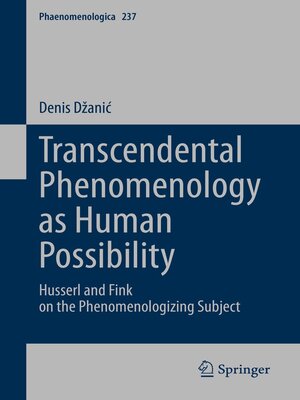Transcendental Phenomenology as Human Possibility
ebook ∣ Husserl and Fink on the Phenomenologizing Subject · Phaenomenologica
By Denis Džanić

Sign up to save your library
With an OverDrive account, you can save your favorite libraries for at-a-glance information about availability. Find out more about OverDrive accounts.
Find this title in Libby, the library reading app by OverDrive.



Search for a digital library with this title
Title found at these libraries:
| Library Name | Distance |
|---|---|
| Loading... |
This book focuses on Edmund Husserl's philosophical collaboration with Eugen Fink which took place in the early 1930s, and shows how their disagreement over the nature, origin, and aim of phenomenology led to a crucial divergence on the issue of who was engaging in phenomenology, and with what motivation. It provides a philosophical investigation of a key moment in the development of Husserl's late phenomenology. The author claims that Husserl's meta-phenomenological exploration of the theoretical and, importantly, practical underpinnings of the transcendental investigator leads him to affirm their humanity and, ultimately, to adopt an ethically charged ideal of "higher humanity" as telos of phenomenology.
Fink argued that phenomenology was essentially an activity beyond the horizon of human possibility and history. In contrast, Džanić illustrates how Husserl was looking for a way to theoretically unite the purity of transcendental insight with the existential reality and practical motives of the phenomenologist. Understanding the complex aspects of this debate is crucial for understanding the Crisis-period of Husserl's thought. This text appeals to graduate students and researchers in phenomenology and related fields of philosophy.






